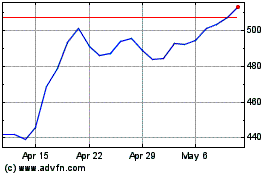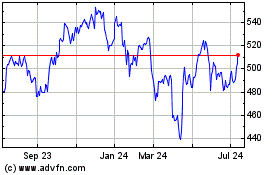UnitedHealth 1Q Revenue, Profit Grow as Membership Expands -- 2nd Update
April 15 2021 - 12:25PM
Dow Jones News
By Anna Wilde Mathews and Matt Grossman
UnitedHealth Group Inc. recorded a first-quarter profit that
beat Wall Street's expectations and raised its projection on
results for the full year, as membership grew in its insurance
business and costs for Covid-19 care declined.
The Minnetonka, Minn.-based company, parent of insurer
UnitedHealthcare and the Optum health-services business, said its
earnings for the first three months of 2021 rose to $5.08 a share,
compared with $3.52 a share in 2020's first quarter.
In his first earnings presentation as chief executive, Andrew
Witty emphasized efforts to tie UnitedHealth's insurance business
to Optum's huge and growing footprint in direct patient care, which
includes an expanding network of physician groups and clinics. Mr.
Witty highlighted a California clinic and community center that
offers services ranging from pharmacy and labs to a gym, and said
the company has "been opening a wide number of different types of
clinics depending on the environment or the locality."
Mr. Witty also pointed to expanding use of the payment method
called capitation, which generally involves insurers paying
healthcare providers set amounts to care for patients, rather than
fees for each service they provide.
The company said it now has around 56,000 doctors employed,
contracted or affiliated with Optum.
With overall unemployment still higher than pre-pandemic levels,
and people expected to catch up on medical care they had delayed
earlier in the pandemic, UnitedHealth said it expected the
public-health crisis to weigh on its results. The company forecast
the pandemic will cause a net reduction in its full-year adjusted
profit of approximately $1.80 a share.
Still, UnitedHealth raised its full-year outlook, citing the
trend in its results from the first three months of 2021.
UnitedHealth said it now expects a full-year adjusted profit of
$18.10 to $18.60 a share. In January, the company had forecast a
full-year adjusted profit of $17.75 to $18.25 a share.
In the first quarter, the company said its adjusted profit was
$5.31 a share. Total revenue grew 9% to $70.2 billion, up from
$64.4 billion in the same three months a year earlier. Revenue from
premiums improved to $55.49 billion, from $50.64 billion a year
earlier.
Analysts surveyed by FactSet had forecast an adjusted profit of
$4.39 a share, on revenue of $69.07 billion.
Shares of UnitedHealth were up 4.2% in morning trading.
The company's first-quarter performance was largely powered by
UnitedHealthcare. In February and March, the insurer saw Covid-19
care at about half the level it saw in January, though it ticked up
slightly after the quarter ended. The company said the
first-quarter Covid-19 costs were still higher than it had
expected.
Non-Covid-19 healthcare use generally rose as expenses related
to the virus dropped off, and overall, medical costs were
"marginally below seasonal baseline," said John Rex, UnitedHealth's
chief financial officer. He said the company expected medical costs
will likely rise later in the year because "people are going to be
more able to access previously deferred care" that they delayed due
to the pandemic, and that they might need "higher acuity levels as
a result of missed or postponed treatments."
The insurer's first-quarter medical-loss ratio, or the share of
premiums spent on healthcare costs, was 80.9%, lower than Wall
Street analysts had generally projected.
In the latest quarter, the number of people served by
UnitedHealthcare's medical plans grew by more than one million to
49.5 million, driven by expansion of the number of people on its
Medicare Advantage plans.
A Medicaid contract award in Oklahoma, growth in specialty
products such as dental and vision plans, and a strong selling
season for commercial benefits also contributed to the insurance
division's first-quarter growth, UnitedHealth said.
Revenue from the company's Optum business grew by 10.8% to $36.4
billion. For the OptumHealth division, which served 99 million
people, revenue per customer grew by nearly a third, in part
because of the increasing acuity of the care provided.
Write to Anna Wilde Mathews at anna.mathews@wsj.com and Matt
Grossman at matt.grossman@wsj.com
(END) Dow Jones Newswires
April 15, 2021 12:10 ET (16:10 GMT)
Copyright (c) 2021 Dow Jones & Company, Inc.
UnitedHealth (NYSE:UNH)
Historical Stock Chart
From Mar 2024 to Apr 2024

UnitedHealth (NYSE:UNH)
Historical Stock Chart
From Apr 2023 to Apr 2024
